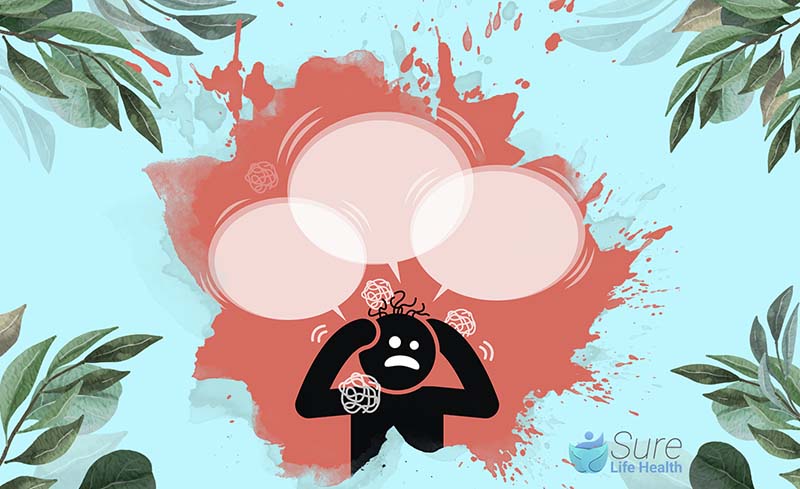Premature ejaculation is a common problem for many men, marked by climaxing too quickly or reaching orgasm sooner than desired by either partner. Several factors can contribute to this issue, including psychological factors and habits related to watching porn.
Whether you’re seeking to improve your sexual health or simply curious about the effects of your digital habits, our article promises to shed light on these crucial questions. Keep reading to unlock valuable knowledge that could pave the way for a new phase in your sexual wellbeing
Does Porn Cause Premature Ejaculation?
There isn’t a definitive study establishing a direct link between watching porn and experiencing premature ejaculation. However, research published in the Journal of Medicine suggests that perceiving oneself as having an addiction to internet porn can result in negative sexual outcomes.
In the fourth edition of Human Reproductive Biology, it’s noted that most studies propose premature ejaculation as a learned response. One theory is that the rapid arousal induced by pornography might teach men to ejaculate quickly, potentially contributing to premature ejaculation.
Additionally, dopamine, a neurotransmitter linked to pleasure, is involved in promoting ejaculation. Pornography has been shown to trigger dopamine release, suggesting that it could affect the speed of ejaculation.

How Does Watching Porn Lead to Premature Ejaculation?
Watching porn can indirectly contribute to premature ejaculation through several psychological pathways:
- Performance Anxiety: Porn often portrays unrealistic sexual scenarios, creating performance anxiety. This stress during sexual encounters can lead to premature ejaculation due to heightened pressure.
- Distorted Perception of ‘Normal’ Ejaculation Time: Pornography can skew a man’s perception of how long it should take to ejaculate. Feeling pressure to match the rapid pace seen in pornographic content may increase sensitivity to sexual stimuli and contribute to premature ejaculation.
- Learned Response: The quick arousal experienced while watching porn may teach men to ejaculate rapidly, potentially leading to premature ejaculation as a learned behavior over time.
- Dopamine Release: Pornography triggers the release of dopamine, a neurotransmitter associated with pleasure. This dopamine surge may influence the speed of ejaculation, contributing to premature ejaculation.
While there isn’t a direct causal link between porn consumption and premature ejaculation, addressing negative perceptions about internet porn and psychological factors related to premature ejaculation – such as performance anxiety and guilt – can help reduce porn consumption and potentially provide long-term treatment for premature ejaculation.
In summary, watching porn can indirectly contribute to premature ejaculation through various psychological factors, including performance anxiety, distorted perceptions of ‘normal’ ejaculation times, and learned responses. Addressing these factors may help reduce porn consumption and improve premature ejaculation outcomes.

What Are the Negative Effects of Pornography?
Frequent consumption of pornography can lead to various negative effects, including:
Performance Anxiety: Porn often sets unrealistic expectations, creating pressure during sex. This stress can lead to erectile dysfunction and other issues due to increased anxiety.

Desensitization: Watching porn and masturbating regularly can decrease sensitivity to sexual stimuli during real-life encounters. This desensitization may result in dependency on pornography to achieve arousal and maintain sexual function.
Interference with Daily Life: Excessive watching can disrupt your ability to lead a productive and fulfilling life. It may hinder intimacy and connection with your partner and other important relationships, impacting your overall well-being and social interactions.
Addiction and Mood Problems: Excessive porn consumption can lead to addiction, causing difficulties in controlling usage and negative mood and behavior consequences. This addiction may foster feelings of isolation, aggression, and a skewed view of sex.
Addressing these negative effects often involves recognizing problematic patterns of porn use and seeking support to establish healthier behaviors and relationships.
How to Reduce Watching Porn
Here are ten practical tips to help overcome a porn addiction:
Clarify Your Reasons: Take some time to reflect on why you want to quit watching porn. Whether it’s to improve your relationship, focus better at work, or enhance your mental well-being, write down your motivations and refer to them when you feel tempted.
Eliminate Temptation: Remove any pornographic materials from your surroundings, whether they’re physical or digital. Delete files, magazines, or bookmarked websites to reduce the urge to indulge in pornographic content.
Identify Triggers: Pay attention to what internal and external cues make you want to watch porn. It could be a particular image, song, or place. Try to avoid these triggers and find ways to cope with cravings when they come up.
Find Healthy Distractions: Engage in positive activities to distract yourself when cravings strike. Exercise, meditation, reading, or pursuing a hobby can divert your attention away from pornographic thoughts and help break the habit.
Seek Support: Don’t hesitate to confide in a trusted friend or loved one about your struggle with porn addiction. Sharing your challenges with someone supportive can provide emotional relief and practical assistance in overcoming addiction.
Join a Support Group: Consider joining a support group or seeking therapy specialized in addiction recovery. Online forums, community groups, or professional counseling services can offer valuable guidance and encouragement on your journey to recovery.
Explore Cognitive Behavioral Therapy (CBT): CBT is a type of therapy that can help you understand why you’re drawn to porn and change negative thought patterns associated with addiction. Consider seeking professional help, like therapy sessions or wellness retreats, for comprehensive support in overcoming addiction
Consider Medication: While there are no FDA-approved medications specifically for porn addiction, certain medications used for related conditions, such as antidepressants or mood stabilizers, may be prescribed to manage underlying factors contributing to addiction.
Remember, overcoming a porn addiction takes time and perseverance. By implementing these strategies and seeking appropriate support, you can take meaningful steps toward breaking free from pornographic habits and leading a healthier, more fulfilling life.
How to Treat Premature Ejaculation
To address premature ejaculation, reducing porn consumption is just one step. Here are several treatment options to consider:
- Moderate Running: Research shows that running moderately for 30 minutes a day, five days a week, could potentially help you last longer in bed.
- Behavioral Techniques: Practice methods like the start-stop or squeeze technique to train your body to delay ejaculation. These involve pausing stimulation before reaching the point of climax and then resuming when the urge subsides.
- Pelvic Floor Exercises: Strengthen your pelvic muscles with Kegel exercises to improve ejaculation control. Studies indicate significant increases in ejaculatory latency time with these exercises.
- Counseling and Therapy: Address psychological factors like performance anxiety through individual or couples therapy. Cognitive-behavioral therapy can also help change negative thought patterns related to premature ejaculation.
- Yoga: Regular yoga practice may improve endurance, potentially helping you last longer during sex.
- Deep Breathing: Focus on deep breathing, especially in the lower abdomen, to increase serotonin levels, which could aid in controlling ejaculation.
- Medication: Consult a healthcare professional about pharmacological treatments such as selective serotonin reuptake inhibitors (SSRIs), which may help delay orgasms.
- Topical Anesthetics: Topical anesthetics containing lidocaine, found in desensitizing sprays, have been clinically proven to prolong ejaculation duration.
Consider trying these treatment options under the guidance of a healthcare provider to find the most effective approach for managing premature ejaculation.
Conclusion
In conclusion, addressing premature ejaculation requires a multifaceted approach. While reducing porn watching is a crucial step, incorporating techniques like exercise, behavioral strategies, therapy, and medication can significantly improve control and satisfaction in the bedroom. Remember, you’re not alone in this journey.
Sharing your journey and seeking guidance from health experts can dramatically change the narrative. For those keen on broadening their understanding of not only addressing premature ejaculation but also improving overall health, Sure Life Health‘s blog is your go-to resource. Discover an array of enlightening articles that offer valuable advice and tips aimed at boosting men’s health and well-being.
Professor Gaye Cunnane, PhD, MB, FRCPI
As the Director of Health and Wellbeing at RCPI, Professor Gaye Cunnane is at the helm of initiatives aimed at enhancing the health and well-being of RCPI Trainers and Trainees. Her role extends beyond administration; she is also a respected clinical professor of rheumatology and a consultant rheumatologist at Trinity College Dublin (TCD) and St James’s Hospital. Prof. Cunnane’s medical journey began at TCD, where she graduated from medical school, and her path has been marked by both clinical and academic excellence.
After completing her basic clinical training in medicine, she embarked on PhD studies at University College Dublin and St Vincent’s University Hospital. Her research during this period was focused on prognostic markers in early inflammatory arthritis, a project that saw her collaborating with esteemed universities across Europe, including in Switzerland, The Netherlands, the UK, and Sweden.
Prof. Cunnane’s career took her to the University of California, San Francisco, where she spent three years delving into research on new treatments for lupus. Her academic prowess led her to the University of Leeds in 2001 as a senior lecturer, before returning to Ireland in 2003 to assume her current roles. She has also served as the National Specialty Director for Rheumatology training in Ireland, Programme Director for Basic Specialist Training with RCPI, and as a past President of the Irish Society for Rheumatology.
PUBLISHED ARTICLES
“Rheumatic disease differentiation using immunoglobulin G sugar printing by high-density electrophoresis”: Published in The Journal of Rheumatology, this study reflects her in-depth investigation into rheumatic diseases.
“Benefits of exercise in patients with rheumatoid arthritis: a randomized controlled trial”: This research work, highlighting the positive impact of exercise on rheumatoid arthritis, underscores Prof. Cunnane’s dedication to practical, patient-centered research.
Additionally, Prof. Cunnane has made notable contributions to the Annals of the Rheumatic Diseases, discussing early referral, diagnosis, and treatment of rheumatoid arthritis. She has also been involved in a study on the NCBI platform investigating exercise benefits in rheumatoid arthritis patients.
Professor Gaye Cunnane’s career is a testament to her commitment to improving patient outcomes in rheumatology through rigorous research, clinical excellence, and dedicated teaching. Her work continues to influence the field of rheumatology, both in Ireland and internationally.

